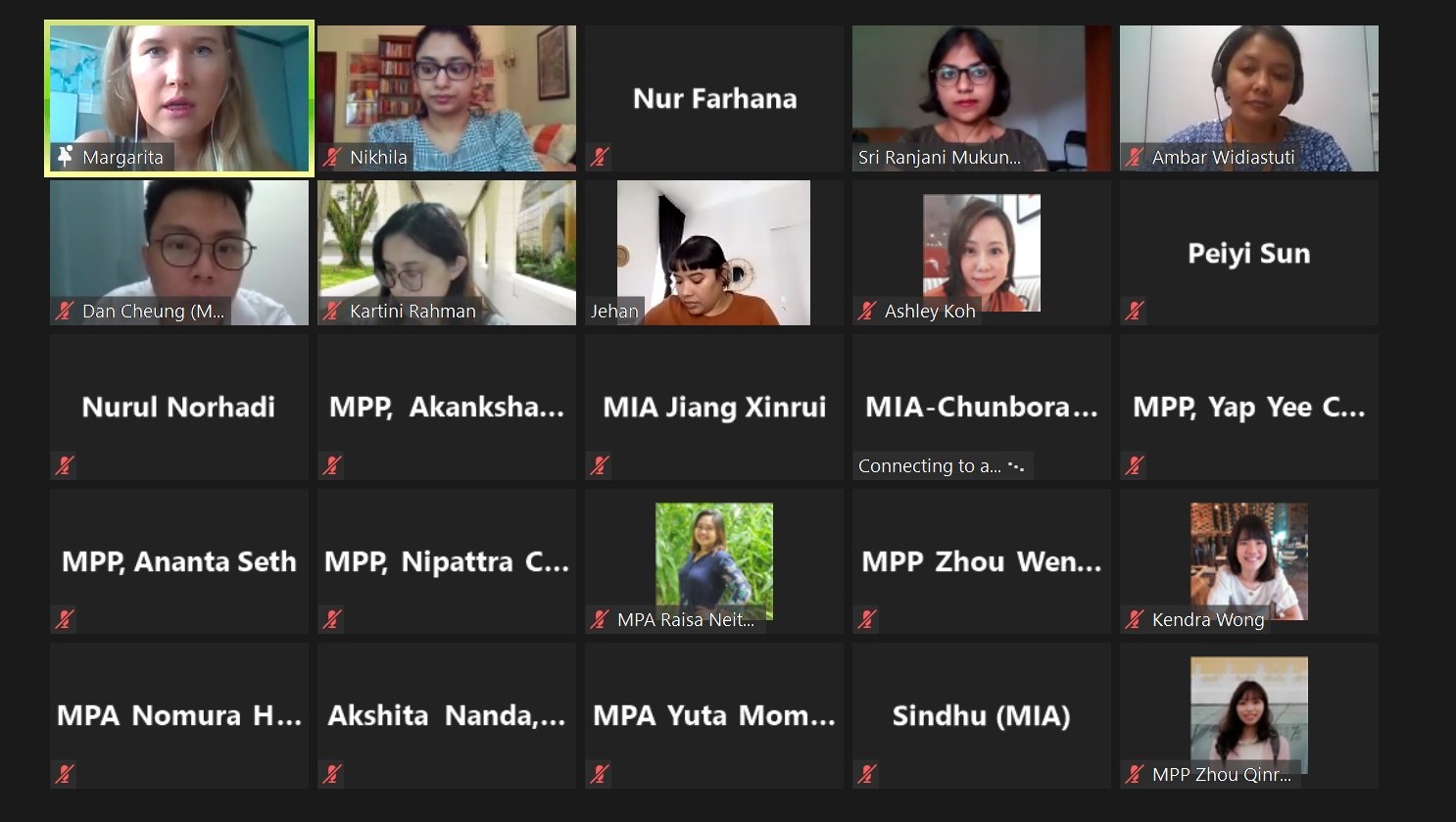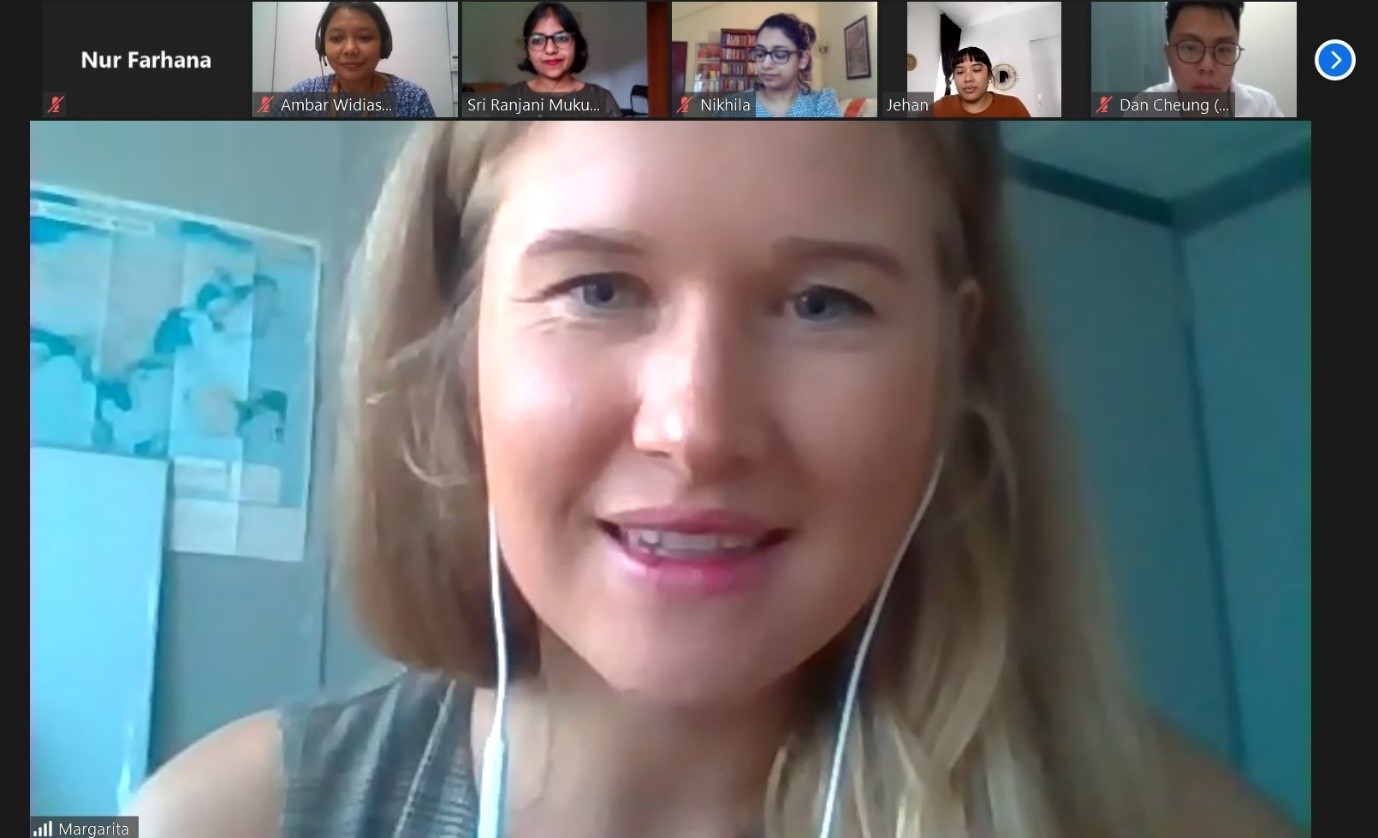
Alumni from the Lee Kuan Yew School of Public Policy who are currently working with the United Nations shared their experiences and insights with students at a panel on October 21, 2020. Panellists included Ms Nikhila Gill (MPP 2014), Ms Margarita Cherkasova (MPP 2016) and Ms Jehan Wan Aziz (MPP 2018). The session was moderated by Ms Sri Ranjani Mukandan (MPP 2021).
Ms Gill is currently head of school-based programmes for the World Food Programme in Khartoum, Sudan. The WFP offers technical assistance and development aid and delivers lifesaving resources to people affected by natural disasters and conflicts. She has also worked with Oxfam in Bangkok.
Ms Cherkasova is a partnerships and knowledge management consultant at the United Nations Economic and Social Commission for Asia and the Pacific (UNESCAP) in Thailand. Her role includes project management, innovation and knowledge exchange initiatives and support to intergovernmental cooperation. UNESCAP is the United Nations’ regional hub that promotes cooperation among countries to achieve inclusive and sustainable development. Before joining the LKY School of Public Policy, Ms Cherkasova worked with the Ministry of Foreign Affairs of the Russian Federation and was posted to Angola and Mozambique. Her experience in the field sparked her interest in a career in international organisations.
Ms Jehan is the Business and Human Rights National Specialist at the United Nations Development Programme (UNDP) in MalaysiaShe currently supports country-level policy coherence, awareness-raising and capacity building activities in the implementation of the UN Guiding Principles on Business and Human Rights (UNGPs). Prior to working with the United Nations, she worked in the Prime Minister’s Department, Government of Malaysia. She is a graduate of the dual degree programme between the Lee Kuan Yew School of Public Policy, NUS, and the School of International and Public Affairs, Columbia University.
The panelists’ advice to students who want to pursue careers with the UN is to think strategically about their interests and skills and work on both.
Ms Cherkasova suggested picking modules that would help students get expertise in areas they are interested in, and also to look for internships. While students may not have decided on their specialisation early in the course, it would help to look at trends in job postings to see what skills are helpful. Skills which are in demand these days include data analysis, statistical analysis and communications skills, including graphic design.

Ms Gill said that apart from applying for UN internships, students could also look to the paid UN Volunteer Programme which places applicants in different agencies. A third option is to work with NGOs that work with the UN, since that would give perspective on fieldwork. Networking is key and LKYSPP alumni are usually helpful resources.
Ms Jehan agreed with her colleagues, saying that it was important to keep monitoring websites of different agencies, since the job postings are regularly updated, and it is also important to gather as much information as possible about the position one is interested in, in order to craft a compelling application.
All said that a key prerequisite for working with the UN is a desire to work for and serve the community. Ms Jehan added that being active in the local community is also one way to identify one’s interests and skills, and will add value to a career in the UN.
Ms Jehan and Ms Cherkasova, work on a contract basis, and are not permanent staff of the UN. She noted that contract-based opportunities represent a good entry point to the organisation. Contract-based opportunities keep teams accountable to the deliverables and deadlines and offer more flexibility and mobility.
Her colleagues seconded this observation. Ms Gill said that short-term contracts gave a chance to upskill and build networks. Ms Cherkasova added that continuous learning, openness to innovation and agility will help candidates to increase their competitiveness in the development scene.
Asked about their varied experiences in different countries, Ms Cherkasova noted that there are different types of roles at the UN: country office roles might include more field work compared to position in the headquarters. Ms Gill said that mundane work routines are similar – meetings, emails, phone calls – but each country presents a different set of experiences and challenges. She has worked in Nepal, Iraq, Rwanda and in Rome before her current posting. She gains great personal and professional satisfaction from meeting the people that WFP is meant to help, and finding out how programmes should be adjusted for maximum benefit.
The panellists also answered questions about how to apply for UN consultancies or internships and how to network. Ms Jehan reiterated the point of applying often and widely within the area of interest, and where one’s skills are in demand. It is normal to face rejections, however, this should not discourage students. Ms Cherkasova agreed and noted the importance of crafting one’s resume so it fit the job description. School projects are research experiences are also relevant if fit the job requirements. Ms Gill added that professors at LKYSPP were often happy to help students get internships through their network of contacts.
Another question on students’ minds was the value of a public policy education and expertise, since technical and data analytical skills are currently more in demand. The panellists pointed out that LKYSPP does offer data analytics modules but a university education is about developing skills that can be applied in different contexts. Ms Jehan said that research and project management are skills that LKYSPP helps students develop, and that these are always in demand. Ms Gill and Ms Cherkasova both noted that the school term was also a good time to develop new language skills that would help with future postings. Knowledge of UN languages is a good asset, as well as region-specific languages.
Their final advice to students was to scan career websites once a month, use existing networks through alumni and professors and keep applying until something interesting comes along. “It can be a frustrating process but keep at it and don’t lose hope. There’s something out there for you,” Ms Jehan said.